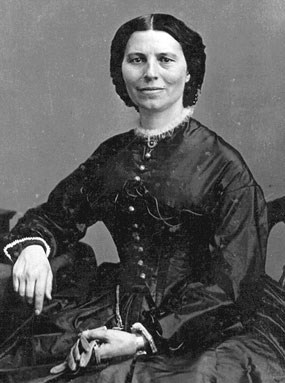
Civil War Trivia 101
People often ask me what I like most about writing. That’s a tough question. I love helping people break free from the lies they believe about themselves. I love the creativity that blooms when dreaming up new characters and plots, wounds and dramatic twists. Being a history nerd, there’s something extra special about writing Civil War stories. I’ve discovered so many fascinating tidbits of information that have helped me see people, history, and human nature in a more robust way. Folks can be quirky, horrible, and still hilarious. Conflict can serve to bring out both the best and worst in all of us. Here are some of the most fascinating pieces of Civil War trivia I’ve discovered.
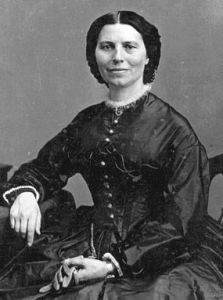 During the Battle of Antietam, Clara Barton tended the wounded so close to the fighting, a bullet went through her sleeve and killed a man she was treating.
During the Battle of Antietam, Clara Barton tended the wounded so close to the fighting, a bullet went through her sleeve and killed a man she was treating.- Female spies had a distinct advantage over their male counterpart. Men were often too embarrassed or feared dishonoring a woman’s reputation or virtue by searching them, even if they suspected a female of nefarious activity.
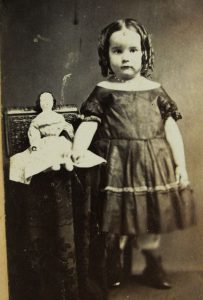 We now know that women passed messages, whether ciphered or not, by a variety of methods…rolling them up into their hair and securing their secrecy with snoods, sewing them into the lining of their dresses, and even passing them through their children’s toys and baby dolls. In some cases, mothers would detach the doll’s head, tuck a message inside and resew the head back on, before telling her child she could bring the doll on an important errand in town.
We now know that women passed messages, whether ciphered or not, by a variety of methods…rolling them up into their hair and securing their secrecy with snoods, sewing them into the lining of their dresses, and even passing them through their children’s toys and baby dolls. In some cases, mothers would detach the doll’s head, tuck a message inside and resew the head back on, before telling her child she could bring the doll on an important errand in town. - Although we cannot be sure of the exact number since women had to hide their identities, it is now known at least 400 women enlisted as men and served as soldiers in the Civil War.
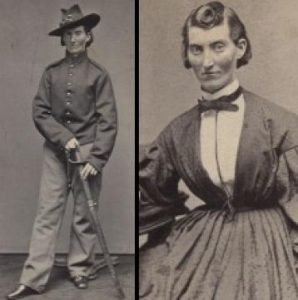
- The tallest Civil War veteran was Confederate Martin Bates, 7’9″. He married Anna Swan, the giantess of Nova Scotia.
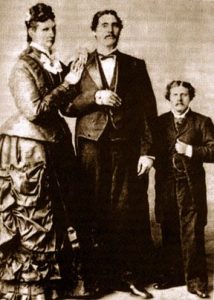
- Daniel Emmett, the composer of “Dixie” was not only from the North, but he was also a loyal Unionist. He was disgusted by the song’s popularity in the South. Lincoln claimed that it was one of “the best tunes I ever heard.”
- Lincoln was shot at, and almost killed, two years before his assassination.
In 1863, Lincoln was riding his horse to his family’s private summer home when a shot rang out. His horse bolted. The private guard at Lincoln’s home saw the president galloping in with a bare head and a wild-eyed horse. Lincoln said the shot scared the horse so badly, it knocked his hat from his head. Two soldiers went back to retrieve his hat only to discover a bullet hole right through the center. Lincoln asked the guards to keep the incident under wraps so his wife needn’t worry. - After the Southern states seceded, both the United States and the Confederacy instituted the first ever national income tax. We’ve been dealing with the IRS ever since.
- When Lincoln was running for president his advisors urged him to grow a beard, insisting it would improve on his looks. He refused until he received a letter from 11 year-old Grace Bedell who penned, “You would look better with a beard for your face is so thin. All the ladies like whiskers and they would tease their husbands to vote for you and then you would be President.”
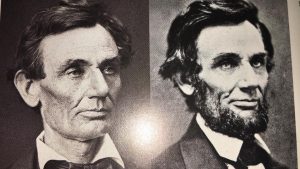 Amused, Lincoln wrote back, “As to whiskers, having never worn any, do you not think people would call it a piece of silly affectation if I were to begin now?” Not long after, he grew a beard and publicly thanked Grace Bedell for her wise advice. He carried her letter with him continually.
Amused, Lincoln wrote back, “As to whiskers, having never worn any, do you not think people would call it a piece of silly affectation if I were to begin now?” Not long after, he grew a beard and publicly thanked Grace Bedell for her wise advice. He carried her letter with him continually. - Much of the slang we use today originated during or around the Civil War. Skedaddle- a military term that meant “to retreat with all haste”. “Hearing it through the grapevine” referred to hearing something through “a grapevine dispatch”, meaning important information passed from person to person instead of using an official means like telegraph. Deadline- Although we think of it as a time when an assignment is due, a “dead line” was much scarier for a Civil War soldier. It referred to the line just around a military prison where prisoners were likely to be shot.
Funnier terms were phrases like “hunkey dorey”, “snug as a bug”, “lucifers” (matches used for lighting fires and cigarettes), and “Arkansas toothpick” (long, sharp knife). - It was required for soldiers to have opposing front teeth so they could open gunpowder pouches. Some of those drafted into war removed their front teeth to avoid service.
- Union Major General Benjamin Butler was cunning but cross-eyed. Southerners despised him for his harsh treatment of Rebels and anyone who showed Confederate sympathies. He declared women who mocked Union soldiers should be arrested and treated like prostitutes. Southern women had the last laugh though when they began selling chamber pots emblazoned with General Butler’s face on the inside.
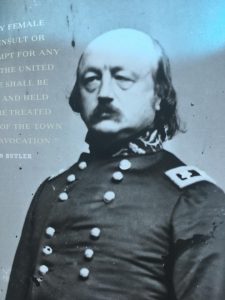
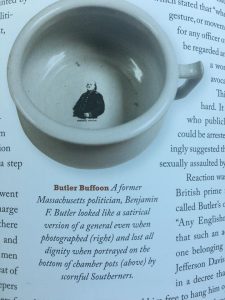
Butler’s cross-eyed looks even drew teasing from President Lincoln who once said, “We must not be too hard on the General. After all, he does not see things the way we do.”
